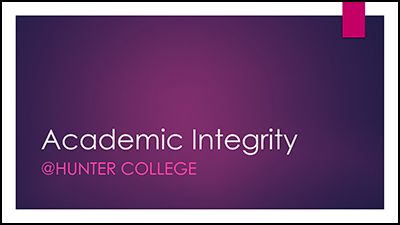About
Academic integrity is a guiding principle of the Hunter College learning community because all students should have the opportunity to learn and perform on a level playing field.
Download Academic Integrity PowerPoint
Academic Dishonesty
Academic dishonesty includes, but is not limited to, cheating, plagiarism, obtaining an unfair advantage, and falsifying records or documents (see examples) whether intentional or not.
Hunter College upholds the right to promote academic integrity on its campus as an educational institution of the City University of New York. The College has the responsibility to review all charges of academic dishonesty and implement sanctions, including, but not limited to, failing the course, official transcript notation, suspension or expulsion from the College when it has been determined that academic dishonesty did occur. See a full list of disciplinary sanctions.
All questions regarding the procedures or the College's disciplinary process should be referred to the Office of Student Conduct in the Vice President for Student Affairs and Dean of Students office. Please call 212-772-4534, 212-396-6484, or email at cba0008@hunter.cuny.edu or ps2676@hunter.cuny.edu.
Initiate the procedure for addressing an allegation of academic dishonesty below.

